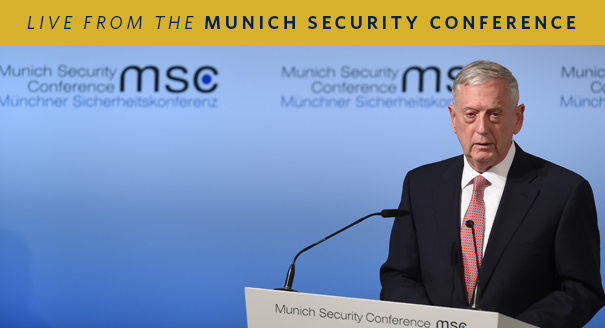Carnegie Europe was on the ground at the 2017 Munich Security Conference, offering readers exclusive access to the debates as they unfolded and providing insights on today’s most urgent international issues. Check out our live coverage here.
*
The 2017 Munich Security Conference, which ended on February 19, exposed a divided West, a United States led by a new administration that wants to put America first, and a European Union facing one of its most important elections for decades.
For good or bad, this is going to be America’s year and France’s year. How the administration of U.S. President Donald Trump deals with Europe, Russia, Iran, and China will have profound implications for global stability. Whom French voters elect as their country’s next president in May will determine the future of the EU.
Despite attempts in Munich by U.S. Defense Secretary James Mattis and Vice President Mike Pence to reassure the United States’ European allies that the transatlantic bonds are unbreakable, they are not the ones who make the decisions in Washington. The occupant of the White House is. Meanwhile, Europe’s future hangs in the balance.
With such uncertainty and unpredictability facing Europe, the United States, and the Western liberal order, here are five takeaways from the Munich Security Conference.
The first is that Europeans—as if they didn’t get enough warning from the team of U.S. senators who attended the event—have to accept that like-minded Americans who care for Europe are now going to be preoccupied with dealing with the Trump administration. From foreign policy—China, Iran, multilateral institutions, and trade—to domestic policy, Americans who believe deeply in the transatlantic relationship will be fighting for their corner in the U.S. Congress. They will be distracted from Europe’s problems.
The second takeaway is that Europeans are facing a U.S. administration that doesn’t take multilateral institutions—and that includes the EU—or multilateral trade deals seriously. Over the past few days in Munich, the UN, the Organization for Security and Cooperation in Europe, and the EU hardly got a look-in from the U.S. administration. Bilateralism and unilateralism seem to be taking precedence over multilateralism.
Germany and other EU countries are very worried about this. These building blocks of the post-1945 security and economic architecture were designed to consolidate the West and provide rules, decent standards of trade, and, particularly, predictability.
The Trump administration hasn’t yet given these institutions notice. But Americans and Europeans who have worked together over the decades greatly fear that it’s only a matter of time until he does. A rules-based West centered on multilateral institutions is no longer a given. Countries that violate the territorial integrity of others may see this as an opportunity to test the vigor and unity of the West.
This leads to the third takeaway: Russia. It figured a great deal at the conference, not least because of its continuing occupation of and meddling in Ukraine, its role in Syria, and its dissemination of fake news and disinformation. German Chancellor Angela Merkel is trying to keep the EU together on rolling over sanctions on Russia when they come up for renewal later in 2017. In Munich, she had to defend the Minsk agreement reached in early 2015 to stabilize eastern Ukraine and develop some kind of road map that would lead to a political solution.
And while U.S. officials said they supported the accord and the upholding of Ukraine’s territorial integrity, it is still unclear what Trump thinks of the agreement and what kind of relationship he wants with Russia. This is bound to be a bone of contention between several EU countries and the United States if Trump wants to push a reset button with Moscow. One thing is certain: Republican and Democratic U.S. senators will put up a fight to counter moves to end the sanctions or weaken U.S. support for Ukraine.
The fourth takeaway is a twist in the relationship between the United States and Europe. The U.S. senators attending the Munich Security Conference asked their European interlocutors to stick with America. What a turnaround in perceptions! While officials from the U.S. administration harangued Washington’s Europeans allies, especially over spending more on defense, nonadministration officials wanted the Europeans to stand firm with the United States. And they wanted a strong EU, not a European continent made up of individual states with no union to anchor themselves to.
The final takeaway has to do with the EU’s future. That future rests with the people of France. Whatever the outcome of the country’s presidential election in May, it will have major consequences for Europe. If the leader of the National Front, Marine Le Pen, is elected president, it will usher in the end of the EU, an organization that Trump has little time for. If one of her contenders, the young and untested Emmanuel Macron, wins, it would provide an extraordinary opportunity for a revitalized Franco-German relationship, with everything that implies: a new energy for the EU and even for the West.
These are the stakes facing Atlanticists and their like-minded allies.








